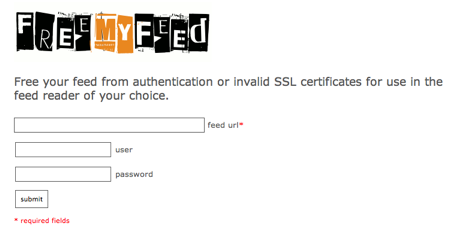Have you even wanted to subscribe to an RSS feed in Firefox, Safari, Internet Explorer, Bloglines or Google Reader (or anywhere else, for that matter), but discover that the feed is inconveniently served from behind a login-protected server? We all have, I think. Well, now a free web service allows you to do just that. As convenient as it is, this is a spectacularly poor idea.
FreeMyFeed handily takes care of those pesky login problems. You give it your feed URL, your login, and your password. It then gives you an alternate URL at FreeMyFeed that contains your login information in an encoded way. FreeMyFeed then acts as a proxy, grabbing the feed without storing your login credentials on its own server, and passing it along to your reader:
So I created a COMPLETELY FAKE login for this blog’s feed. The login does not exist, does not work, and is (of course) not a real login to anything: username rss4lib and password temp1234. The FreeMyFeed link that encodes this is:
http://freemyfeed.com/feed/aHR0cDovL3d3dy5yc3M0bGliLmNvbS9pbmRleC54bWw6OnJzczRsaWI6OkxzUGcwWHRrRktDUytJdkFrUTFMN0RvNk5BPT0=
Well, it is encrypted, but there’s usually a good reason that a feed is behind a login. This takes those feeds and puts them out in the public, where any search engine find them, index them, and expose your organization’s secure information. End runs around reasonable security are poor choices. I would recommend that, if your organization has RSS behind a login, that you work with your technical group to block FreeMyFeed from accessing your site.
To their credit, there is a fairly explicit disclaimer of the risks on the FreeMyFeed front page, that includes a warning to be careful and not to share your personalized URL with anyone (other than the feed readers, of course). So if you must use this tool, use it only on your own browser, not on an aggregator to minimize the sharing of an all-access URL to your feed. Don’t be tempted.

